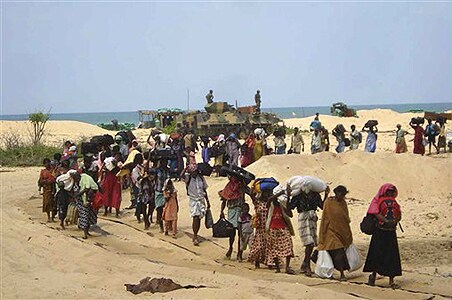
The UN Secretary General Ban Ki-moon on Tuesday began his day at the UN General Assembly refuting charges that his office had deliberately underestimated casualty figures in Sri Lanka.
"This he categorically rejected. He said that the UN never tried to downplay the numbers. The numbers that were circulating were estimates from the ground after that we lost sight of them ... we had no way to verify them," said Michele Montas, Spokesperson for the UN Secretary-General.
This weekend, the British Times newspaper and France's Le Monde had both published articles pointing to a far higher civilian death toll in the final months of the civil war in Sri Lanka than previously reported by the UN.
The news reports have stated that over 20,000 civilians had been killed as Colombo crushed the 30-year-old LTTE insurgency last month, in contrast to the UN's figures of 7,000 dead in early May.
Human rights organizations are starting to focus on the discrepancy. Amnesty International has now called for an independent probe into the numbers and has also urged the UN to reveal its own estimates.
Matthew Lee an investigative journalist who traveled with the Secretary General to Sri Lanka in May says the allegations of a muted UN response to civilian deaths would have serious repercussions if proved to be true.
"It even sets a precedent for other humanitarian disasters like Darfur. If the government of Sri Lanka can strong arm the UN to hide causality figures that's what the next government that wants to wipe out civilians is going to do," said Matthew Russell Lee, journalist, Inner City Press at the UN.
The Secretary General's office has been quick and vehement in its denial to down play the number of causalities in Sri Lanka.
Yet, for an organization, which has lost virtually all credibility in fighting genocide and ethnic violence, over the past decade, the latest allegations will only lead to more forceful calls for a serious overhaul.
Track Latest News Live on NDTV.com and get news updates from India and around the world

